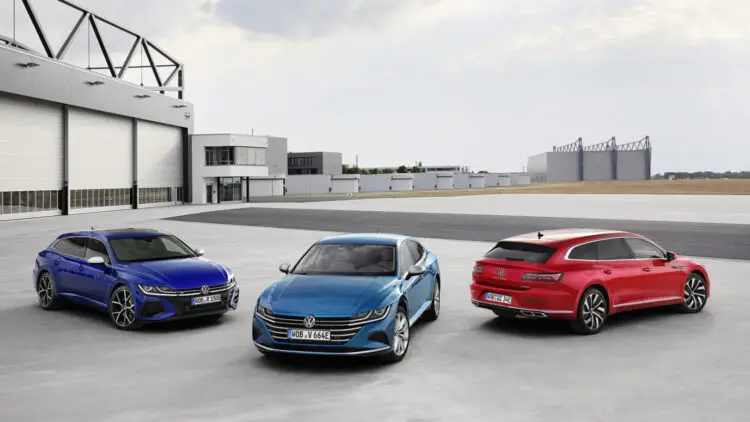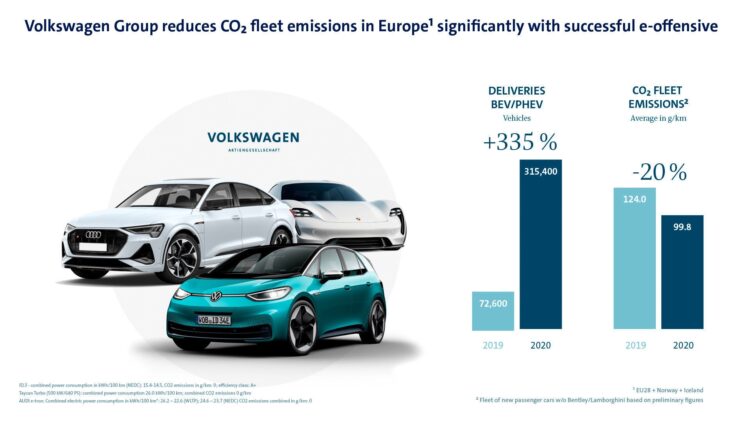The Volkswagen Group is facing a €100 million fine for missing the EU fleet CO2 emissions target despite a 20% drop in pollution in 2020.

The Volkswagen Group announced that it has missed its European Union CO2 emissions target for 2020 by around 0.5 g/km. As a result, the group is facing an EU fine of over €100 million. Volkswagen brand and Audi over fulfilled fleet targets but clearly not sufficiently to balance out the other brands in the group including Porsche, Seat, and Skoda. In 2020, the average CO2 emissions of the Group’s new passenger car fleet in Europe decreased by around 20 percent compared with 2019. Volkswagen expects to meet the 2021 target.
Volkswagen Group Missed EU CO2 Emission Target in 2020
The Volkswagen Group, together with other manufacturers including MG Motor and a few small electric car producers, has launched a CO2 pool for passenger car registrations in the European Union. Based on preliminary figures, this pool achieved average CO2 emissions of 99.3 g/km, thus narrowly missing its 2020 target by around 0.5 g/km.
Based on preliminary figures, the Volkswagen Group claims to have reduced the average CO2 emissions of its new passenger car fleet in the EU by around 20 percent compared with 2019 to 99.8 g/km in 2020.
The final confirmation by the EU Commission is to follow at a later date. The total EU fine is likely to be just over €100 million.
Volkswagen announced that VW brand and Audi more than met their targets in 2020, so Porsche, Seat, and Skoda presumably all exceeded their limits. The emissions of Bentley and Lamborghini are measured individually, as small producers receive special treatment and conditions.
Volkswagen Group Increased Electric Car Sales in Europe in 2020

The Volkswagen Group narrowly missed its EU CO2 emission target in 2020 despite the group’s e-offensive gaining traction: deliveries of electric models in the EU including the UK, Norway, and Iceland increased more than fourfold in 2020 to a total of 315,400 electric vehicles (2019: 72,600).
The proportion of battery electric vehicles (BEVs) and plug-in hybrids (PHEVs) in the total deliveries rose to 9.7 percent (2019: 1.7 percent). The Volkswagen Group is thus the clear market leader in the all-electric segment in Western Europe, accounting for a share of around 25 percent (2019: 14 percent).
The main drivers of this development were the Volkswagen Passenger Cars and Audi brands, which over fulfilled their CO2 fleet targets largely due to the successful start-up of the VW ID.3 and Audi e-tron electric models.
Volkswagen Brand Met EU CO2 Emission Target in 2020
Volkswagen Passenger Cars was the first Group brand to deliver all-electric vehicles based on the Modular Electric Drive Toolkit (MEB) to customers in 2020. Launched in September, the ID.3 has enjoyed great demand from customers, with 56,500 vehicles already handed over by the end of the year.
A total of around 212,000 electric Volkswagen vehicles were transferred to customers in 2020, including around 134,000 BEVs. This means that the brand significantly over fulfilled its CO2 fleet target and made a considerable positive contribution to the Group.
Audi Met EU CO2 Emission Target in 2020
The Audi brand also came within its CO2 fleet target in 2020 and contributed positively to the Group. The brand continues its transformation into a provider of sustainable premium mobility. It claims to have been the largest manufacturer of electric vehicles among the three German premium brands in 2020.
The Audi e-tron model (incl. Audi e-tron Sportback) recorded a significant increase in demand in the past year, with year-on-year growth of 79.5 percent (47,300 vehicles). Worldwide, the Audi e-tron is the best-selling electric vehicle among German premium manufacturers.
Volkswagen Group Electrification Plans
The Volkswagen Group will systematically step up its e-offensive in 2021 with a large number of new all-electric vehicles based on the Modular Electric Drive Toolkit (MEB). Audi will start with the Q4 e-tron and Q4 e-tron Sportback, CUPRA will launch the el-Born and ŠKODA will bring the Enyaq iV to its customers. Volkswagen Passenger Cars will launch the ID.4 in a number of additional markets and present a new all-electric model.
Volkswagen is the first automotive group to commit to the Paris Climate Agreement and intends to become climate-neutral by 2050. The Group aims to become the leading provider of electric vehicles worldwide by 2025. Until then, around €35 billion of investments are therefore planned in e-mobility and another amount of around €11 billion in the hybridisation of the model portfolio.
The Group is planning to sell around 26 million battery electric vehicles by 2030. Around 19 million of these vehicles will be based on the Modular Electric Drive Toolkit (MEB), while most of the remaining 7 million vehicles will be based on the High-Performance Platform (PPE). The Group expects around 7 million hybrid vehicles in the same period.
About the Volkswagen Group
The Volkswagen Group, with its headquarters in Wolfsburg, is one of the world’s leading automobile manufacturers and the largest carmaker in Europe. The Group comprises twelve brands from seven European countries: Volkswagen Passenger Cars, Audi, SEAT, ŠKODA, Bentley, Bugatti, Lamborghini, Porsche, Ducati, Volkswagen Commercial Vehicles, Scania, and MAN. The Volkswagen Group sells its vehicles in 153 countries.
In 2020, the total number of vehicles delivered to customers by the Group globally was 9.30 million (2019:10.97 million). The passenger car global market share was 12.9 percent. Group sales revenue in 2019 totaled EUR 252.6 billion (2018: EUR 235.8 billion). Earnings after tax in the fiscal year 2020 amounted to EUR 14.0 billion (2018: EUR 12.2 billion).
